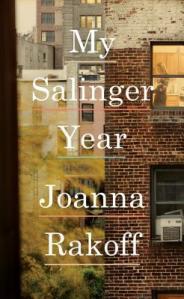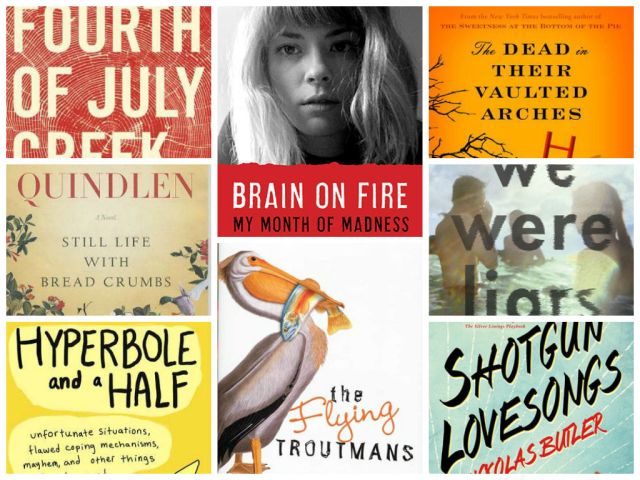Summer hours and a week-long getaway made for a great month of reading for me. New releases and many titles that had been lingering on my to-read for far too long are finally finished.

By the numbers: 13 books, 13 reviews on Goodreads, 5 reviews on alenaslife, 4 oldies from my shelf – #dustingoffmybookshelf, 2 from my 2014 personal challenge (set in a foreign locale & a classic), 1 audio
From most to least favorite:
The Painter, Peter Heller Reviewed
Mr. Penumbra’s 24-Hour Bookstore, Robin Sloan Reviewed
Close Your Eyes, Hold Hands, Chris Bohjalian Reviewed
The Girl You Left Behind, Jojo Moyes Reviewed
Birds of a Lesser Paradise, Megan Mayhew Bergman
This outstanding collection of short stories has been on my to-read shelf for years just waiting for my discovery. I fell hard for these brilliant, quirky, animal inspired stories. All are about survival despite the odds. They inspired me and entertained me. Bergman is definitely an author I’ll watch for.
“I wished for things to stay the same. I wished for stillness everywhere, but I opened up the rest of the bedroom windows and let the world in.”
The Invention of Wings, Sue Monk Kidd Reviewed
Bellweather Rhapsody, Kate Racculia
Another book that defies any easy description. Mix together temperamental artists, teen angst, middle-ages loneliness, and a mystery. Then plop all of it in a crumbling Shining-style grand hotel and you’ll get a feel for this novel. High drama and high stakes vs. ruin and decay. Really enjoyed reading it, even if I couldn’t swallow the actual story line.
“Maybe that’s what he reminds her of: they are both full of dark corners, odd places, possibly ghosts.”
Their Eyes Were Watching God, Zora Neale Hurston
A very difficult read for me for two reasons. 1) All of the dialog is in heavy dialect so I had to pick apart the language, especially in the first half. 2) I have a hard time not applying my modern values/standards to what I read — which is really unfair given the early 20th century, black community setting of this book. I sometimes wanted to shake the main character Janie, but ultimately, I’m really glad I read this book. It will stick with me.
“The years took the fight out of Janie’s face. For a while she thought it was gone from her soul…But mostly she lived between her hat and her heels, with her emotional disturbances like shade patterns in the woods — come and gone with the sun.”
Silver Linings Playbook, Matthew Quick
Engrossing and enjoyable read despite the heavy mental illness subject matter. Even though I didn’t see the movie I was heavily influenced by its stars in visualizing this book as I read.
“I am practicing being kind over being right.”
Emotionally Weird, Kate Atkinson
This novel has so much confusion — stories within stories, mysterious characters coming and going, multiple fonts, unreliable narrator(s) — all purposeful. I was often lost, but never frustrated or disinterested because it also has Atkinson’s wit, humor and beautiful writing. I suppose there’s a plot — mother and daughter on a decaying Scottish island trying to tell their personal truths, claim identity. It’s all rather circular and a little bit beside the point (although, true to Atkinson’s other works, there are multi-layered connections among characters and everything gets tied together well.)
“Memory is a capricious thing, of course, belonging not in the world of reason and logic, but in the realms of dreams and photographs — places where truth and reality are tantalizingly out of reach.”
The Secret Life of CeeCee Wilkes, Diane Chamberlain
This book is much more made-for-tv-movie than my usual reading choices, but I had no trouble getting caught up in CeeCee’s story. It’s fast paced and engaging, even if I don’t want to believe any woman (even a 16 year-old) would be gullible enough to fall for the lines that ensnared CeeCee.
“You got dealt some crappy cards. But you’re the one who has to decide how to play them.”
Americanah, Chimamanda Ngozi Adichie
A carry over from June, I struggled to make my way through this book, which I truly wanted to love. I liked the first part and the last part (up until he final 2 pages), but the 300+ pages in the middle left me unmoved, even a little bored. There were some things I loved. I love the blog posts that show up in the novel. These were the most enlightening, passionate, personal moments in the novel, I loved learning about Nigeria and Nigerian culture. Certainly my eyes were opened to the many ways in which Americans (myself included) are blind to racism and cultural identity.
“And her joy would become a restless thing, flapping it’s wings inside her, as though looking for an opening to fly away.”
The Wife, The Maid and the Mistress, Ariel Lawhon on audio
This historic fiction is based on the real-life disappearance of New York State Supreme Court Justice Joseph Creighter in 1930s. Lawhon does a great job of evoking the era, filled with politicians, gangsters and corruption and sets up some delicious characters as the title implies. I wasn’t crazy about the mystery itself. The plot developments felt a little forced and overall, it moved too slowly to make it thrilling. (I probably would have preferred to read the print instead of listening to the audio over the course of a month.)
“His hand left a trail of shame across her skin.”
My July Photo Collage is comprised of book covers provided by Goodreads.









